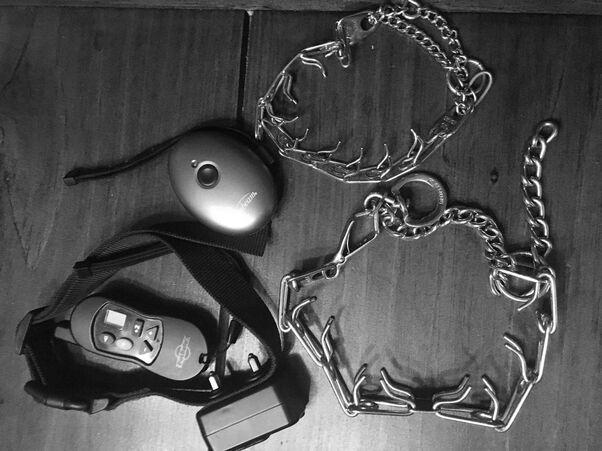 My motto is "training one end of the leash, educating the other". Today's lesson: Buyer Beware. In the picture below are "training tools" I acquired from one client, with one dog. The client called me because her dog is still highly reactive to other dogs, even after using these "tools". I asked if the reactivity is getting worse, and her answer was yes. That may come as no surprise to you, because several scientific studies have concluded that training dogs using confrontational methods (punishment) is associated with aggressive responses in many cases (1,2). What you may find surprising is that these "tools" are used by some professional dog trainers every day. That's right, the people that should know better are using "tools" that have been shown to be associated with causing aggression. But how can that be? How can a professional, who has an education in animal behavior, hours of hands-on experience, and an unlimited amount of scientific data at their fingertips, use "tools" that make a dog's reactivity worse? Well, because the dog training industry is unregulated and does not require any sort of education or experience. None. Zero. Zip. I feel so bad that my new client and her dog have been duped. Her previous trainer never told her he was going to use prong and shock collars. His website makes no mention of them. In fact, it says he uses positive reinforcement. So how do we know who and what to believe? Trainers may advertise that they use modern, humane training methods, and it might be true. But it might be a flat out lie. As Jean Donaldson, founder of the Academy for Dog Trainers suggests, ask your trainer the following questions:
If you don't get a straight answer, or your gut is telling you it doesn't sound right, run (don't walk) away. My philosophy is simple and crystal clear: I don't use choke, prong, or choke collars. Period. I won't yell at or hit your dog. Ever. It's time we stand up to these uninformed, uneducated, and unethical bullies that call themselves dog trainers and tell them, "You are not going to hurt my dog anymore!" 1. Herron, Meghan E., Frances S. Shofer, and Ilana R. Reisner. “Survey of the use and outcome of confrontational and non-confrontational training methods in client-owned dogs showing undesired behaviors.” Applied Animal Behaviour Science 117, no. 1-2 (2009): 47-54. 2. Casey et al.Casey, Rachel A., Bethany Loftus, Christine Bolster, Gemma J. Richards, and Emily J. Blackwell. “Human directed aggression in domestic dogs (Canis familiaris): Occurrence in different contexts and risk factors.” Applied Animal Behaviour Science 152 (2014): 52-63. Comments are closed.
|
AuthorJeff Dentler, CPDT-KA, IAABC-ADT, FFCP, CTDI Archives
July 2024
Categories |

 RSS Feed
RSS Feed